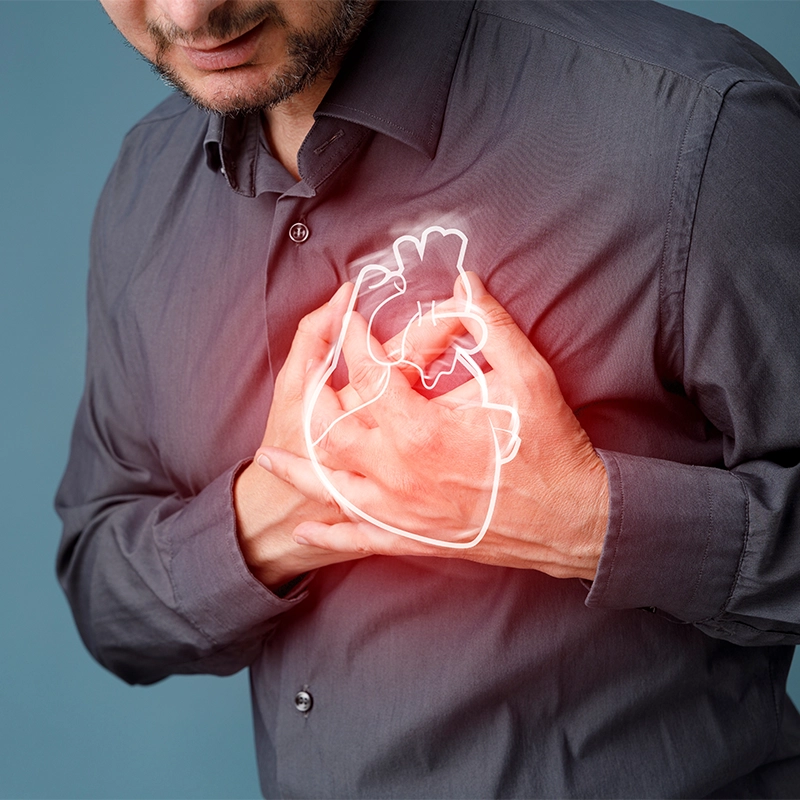
Understanding Heart Failure
Heart failure is not a singular disease; rather, it is a syndrome caused by various cardiovascular conditions that weaken the heart muscle. The most common causes include coronary artery disease, hypertension, heart valve problems, and cardiomyopathy. As the heart weakens, it struggles to maintain adequate blood flow to meet the body's demands. Consequently, patients may experience symptoms like fatigue, shortness of breath, fluid retention, and reduced exercise tolerance.
How common is heart failure?
- 1-year mortality of untreated pts is 25% and 5 years mortality is 50%.
- Over 3/4th of patients after MI develop heart failure within 5 years.
- 1% of the general population between 55-65 years of age.
- 3% between 65 to 74 years
- 7% from 75 to 84 years
- 20% over 80 years
- Beyond 70 years heart failure is the most common reason for hospitalization.
Heart failure is a serious medical condition in which the heart's ability to pump blood efficiently is compromised, leading to a range of debilitating symptoms and, in severe cases, life-threatening complications. For some patients with end-stage heart failure, a Left Ventricular Assist Device (LVAD) can be a crucial bridge to heart transplantation or even a long-term therapy option.
Signs and Symptoms of Heart Failure
Common signs and symptoms of heart failure include:
- Shortness of breath, especially during physical activity or while lying down.
- Persistent fatigue and weakness, even with minimal exertion.
- Swelling in the legs, ankles, or abdomen due to fluid retention.
- Rapid or irregular heartbeat (palpitations).
- Persistent coughing or wheezing, accompanied by white or pink phlegm.
- Decreased ability to exercise or engage in physical activities.
- Sudden weight gain caused by fluid buildup.
- Feeling dizzy or lightheaded, especially when standing up.
- Loss of appetite and nausea.
- Difficulty concentrating or feeling confused.
- Chest pain or discomfort in some cases.
Cause of Heart Failure
- May be genetic or acquired Myocarditis, post-MI, Valvular heart disease, etc
- Ischemia is the most common cause in men whereas in women hypertension/DM is the most common cause.
Heart Transplantation: The Ultimate Solution
Heart transplantation is considered the gold standard treatment for end-stage heart failure when all other therapies have failed. A heart transplant involves replacing a failing heart with a healthy heart from a deceased donor. However, the limited availability of donor organs and the complexities of the transplantation process mean that not all eligible patients can receive this life-saving treatment.
Enter LVAD: A Bridge to Transplantation
In situations where a patient is eligible for a heart transplant but no suitable donor heart is immediately available, or in cases where transplantation is not a viable option, LVADs step in as a bridge to either heart transplantation or a long-term solution. An LVAD is a mechanical device that assists the heart in pumping blood effectively, reducing the workload on the weakened heart muscle.
How LVADs Work
LVADs are typically implanted in the patient's chest and connected to the left ventricle and aorta. These devices can either be pulsatile, mimicking the heart's natural pulsations, or continuous flow, providing a constant blood flow. The power source for the LVAD can be external or internal, allowing patients greater mobility and improved quality of life. Advanced LVAD technology has made significant strides in terms of durability and miniaturization, making them more reliable and safer for long-term use.
Benefits of LVAD Therapy
Improved Quality of Life: LVADs can alleviate heart failure symptoms and improve a patient's ability to engage in daily activities and exercise.
Bridge to Transplantation: For patients awaiting a heart transplant, an LVAD can sustain them until a suitable donor heart becomes available.
Destination Therapy: In some cases where transplantation is not feasible, LVADs can serve as a long-term therapy option, allowing patients to lead more fulfilling lives.
Heart Recovery: In certain instances, LVAD therapy can enable the heart to recover some of its functions, making transplantation unnecessary.
Challenges and Considerations
While LVADs offer hope and promise, they come with their own set of challenges:
Device Complications: LVADs are associated with potential complications such as bleeding, infection, device malfunction, and blood clot formation.
Lifelong Management: LVAD recipients require ongoing medical follow-up, lifestyle adjustments, and strict adherence to medication regimens.
Cost and Accessibility: LVAD therapy can be expensive, and not all healthcare systems have equal access to this advanced technology.
Ethical Considerations: The allocation of LVADs and donor organs raises ethical questions and demands careful consideration.
Conclusion
Heart failure is a debilitating condition that affects millions worldwide, impacting the daily lives of patients and their families. LVADs have emerged as a valuable tool to support those with advanced heart failure, providing relief from symptoms and a renewed sense of hope. However, heart transplantation remains the gold standard for curing end-stage heart failure, offering patients a chance at a new lease on life.
As medical technology advances and research progresses, the future holds promise for even better treatments and outcomes for those facing heart failure. Until then, the tireless efforts of healthcare professionals, coupled with the unwavering spirit of patients, continue to push the boundaries of possibility in the fight against heart failure. A heart transplant in Bangalore at Sakra World Hospital, with its top-notch medical facilities and knowledgeable cardiac surgeons, can provide a ray of hope for patients with advanced heart failure.

